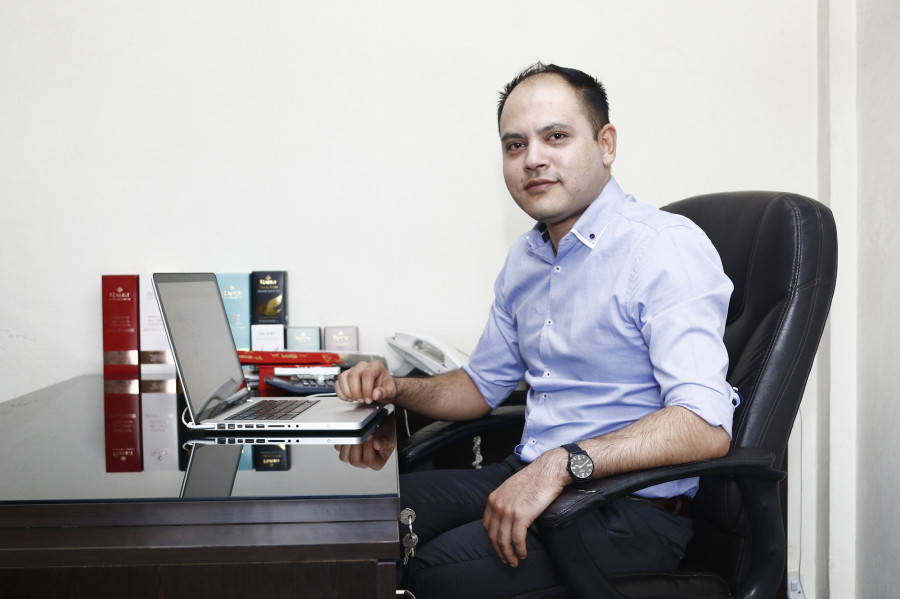Interviews
Neeraj Rathi: Don't be afraid to get your hands dirty
Rathi says it was important to have a clear vision, from the beginning, to compete with the finest teas in the world
Srizu Bajracharya
One of the things Neeraj Rathi, managing director of Rakura, a tea brand from Himal Tea Industries, can't seem to stop talking about is ‘tea’. He believes that ever since Rakura’s entry into the market—both in Nepal and internationally—in 2012, the brand has aspired to raise the standard of Nepali tea. Rathi says it was important to have a clear vision, from the beginning, to compete with the finest teas in the world. In this interview with the Post's Srizu Bajracharya, Rathi shares insights on his work ethics, vision and Rakura's market strategy. Excerpts:
In recent years, Rakura has become more visible in the market, what drove this change?
When we started Rakura, we wanted to redefine Nepali tea. Earlier, Nepali tea was known as Himalayan tea and it used to be exported as a product of Darjeeling or Germany without mention of its origin.
Nepali teas are one of the finest in the world—but not many people knew about this. So, we have marketed Rakura to put Nepali teas on the map as well. I think it was our vision for excellence from the very beginning that has increased our brand visibility. Additionally, we also embraced new standards, technology, and flavours to build more loyal customers.
How have you instilled this vision of 'excellence' in your employees?
Our work environment is amicable. During the team meetings, we encourage our employees to pitch new ideas or discuss relevant issues, apart from just discussing meeting agendas. I tell my employees whatever they do, it is for their growth. I continuously try to build ownership towards the company, because I believe people perform better when they are given full responsibilities to implement their ideas.
I also try to make them understand that Rakura is a global company, and we need to keep pushing forward with new ideas that meet international standards. That is the reason we still have employees who were with us since this company’s inception.
What sets Rakura apart from other tea companies in Nepal?
We are innovative with our products and want them to be known as the best in the world. We continuously work towards creating an excellent product that imbues our brand with value.
For a long time, tea has been advertised as a healthy drink, but I can confidently say that Rakura has really adopted that label: our teabag is the healthiest and most eco-friendly in the world. We use ecological food-grade tags with food-grade ink—our customers don't have to worry if the tag falls in the tea. Our tea bags are double chambered, so when dipped into water, the flavour infuses from five directions. We work in detail.
As a prominent tea estate in Nepal, how have you been addressing the labour issues?
When the government increased tea labourers’ daily minimum wages and made social security mandatory last year, tea factories weren't exactly against fulfilling the new wage. We understand the needs of our labourers.
But the government also needs to provide us with financial security to support our business. We bring in money that directly affects the economy of Nepal but we have to lobby for export ourselves. Even in other countries, governments provides tea estates with subsidies to run their businesses, and we have demanded the same from our government but that has not been met.
In a city with a growing coffee culture, how are you planning to compete?
Yes, it's undeniable that in the last decade there is a significant increase in coffee culture. But, I still think its the other way round; coffee is competing with tea because a majority of Nepalis start their day with tea.
Regarding the international market, even countries like the US are exporting tea—it is, in fact, one of the largest tea-exporting countries.
For Rakura, we had a very different vision from the start—our packaging meets international standards, our tea bags are food-graded and eco-friendly. Many people even thought it was a foreign brand.
What do you think about the future of agri-business when many youths are leaving for foreign employment, seeking better opportunities?
I believe the future for Nepal lies in agri-business—it has the potential to bring good revenue into the country, in addition to creating employment opportunities. Although many youth are leaving Nepal for better opportunities, I believe that they will eventually realise the potential in Nepal and return home—I came back too.
I have also come across a number of Nepali people setting up agri-businesses here in Nepal, after studying and working in foreign countries. The experience during foreign employment changes your perspective and makes you competitive, and I think that experience is also essential.
What advice do you have for young people who want to join a company like Rakura?
Loyalty is the main quality I look for in my employees. I want them to take charge of their work.
There is one particular question I always ask during interviews: 'Are you afraid of getting your hands dirty?’.
Everyone should be ready to do everything. You really should be prepared to work, it shouldn’t be a matter of dignity—which is really prevalent here. You can't define anything as too big or small when you are working.




 9.6°C Kathmandu
9.6°C Kathmandu












